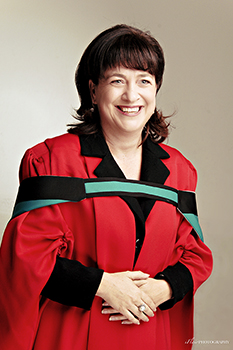Latest News Archive
Please select Category, Year, and then Month to display items
22 September 2021
|
Story Michelle Nöthling
|
Photo Supplied
 Annemarie Le Roux.
Annemarie Le Roux.
“I love working with children.” This is one of the first things Annemarie le Roux mentions when asked to describe herself. This love for children propelled Annemarie into the field of education and she graduated in 2006 with a BEd in Foundation Phase at the UFS. Annemarie immediately immersed herself in the Deaf community, enriching the lives of children at the Thiboloha School for the Deaf in Qwaqwa and the De la Bat School for the Deaf in Worcester.
The academic world enticed Annemarie back to the University of the Free State (UFS) and she was appointed as a junior lecturer in the Department of South African Sign Language (SASL) and Deaf Studies in 2013. Going from strength to strength, Annemarie completed her master’s degree in SASL in 2019, and published an
article earlier this year that she co-wrote with Marga Stander. In this article, they found that SASL “has become an increasingly popular language that hearing university students want to learn as a second language” and subsequently explored different teaching methods used for this emerging group of interested students.
Although now firmly established in academia, Annemarie is still committed to the practical application of SASL. “I am closely involved in student and community engagement through the
SIGNALS Sign Language student association that helps empower the Deaf community and South African Sign Language.” She also interprets for the Deaf community whenever she gets an opportunity, as well as for Deaf students in class and meetings.
On the importance of Sign Language and the recognition of the Deaf community in South Africa, Annemarie believes it will open greater opportunities for development. “More people will be able to learn SASL, and it might even become a subject in school for hearing children.”
First Dementia Care Mapper in Africa receives international award
2015-11-17

The first Dementia Care Mapper from Africa,
Dr Sanet du Toit.
Photo: iFlair Photography |
“In one facility, four elders who needed minimal assistance to eat were provided with an opportunity to sit at a separate table, and enjoy their breakfast as preferred – that is, to spread bread with butter, jam or marmite; to add their own milk and sugar to their tea.”
Dr Sanet du Toit described a scenario where staff members at an old-age home implemented recommendations she made following an observation she conducted.
“We do not think twice about doing this but, within institutional care settings, these ’normal’ routines are often replaced with practices that could be viewed as ‘time savers’. For example: everyone gets milky, sweet tea to drink,” she explains.
Yet, by creating an environment where the elderly living with dementia were at liberty to determine the amount of milk in their tea, active participation meant an improved well-being.
She was honoured with the International Association of Homes and Services for the Aging (IAHSA) Award for Excellence in Applied Research on 1 September 2015, at a joint conference held by the Aged & Community Services Australia (ACSA) and IAHSA in Perth.
This exceptional Occupational Therapist from the University of the Free State (UFS) emerged as the first Dementia Mapper from Africa. Dementia Care Mapping is a method used internationally to assess with the purpose of improving the quality of care given to residents in institutionalised settings.
The IAHSA award acknowledged her person-centered care training and research in South African residential care facilities while working at the UFS as a senior lecturer from 2003 to 2013. Currently, she is based at the University of Sydney, but remains an affiliated lecturer at the UFS Department of Occupational Therapy.
In 1992, she graduated with a BA in Occupational Therapy at the UFS, and went on to further her studies at various institutions. Also, she is one of the founding directors of the Eden Alternative South Africa, an advocacy for older persons’ rights within old-age homes. Over the years, Dr du Toit has won numerous awards for her research.